|
|
|
Sort Order |
|
|
|
Items / Page
|
|
|
|
|
|
|
| Srl | Item |
| 1 |
ID:
162453


|
|
|
|
|
| Summary/Abstract |
Can developmental aid bring peace to war-torn communities? The current literature is divided on this issue. One line of reasoning suggests that aid is likely to decrease violence by improving employment and prosperity, thereby making participation in conflict more costly. Another view cites evidence showing an association between aid projects and increased insurgent activity. Addressing this contradiction, we argue that different types of aid projects lead to different outcomes, as some projects foster an unequal distribution of benefits within communities. Our reasoning draws on qualitative accounts from conflict zones, recent research on how grievances associated with exclusion can foster civil war onset, and experimental findings regarding perceived inequity and punishment. Building on this scholarship, we use a recently developed event-matching methodology to offer insight from contemporary Afghanistan. Aid projects that tend to exclude portions of the community yield more insurgent activity in their wake than more inclusive projects. These results shed light on why some aid projects reduce violence while others do not, emphasizing that efforts to ‘win hearts and minds’ can be a source of both contentment and contestation.
|
|
|
|
|
|
|
|
|
|
|
|
|
|
|
|
| 2 |
ID:
157584
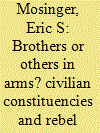

|
|
|
|
|
| Summary/Abstract |
Why do united rebel fronts emerge in some insurgencies, while in other insurgencies multiple rebel groups mobilize independently to challenge the state, and often, each other? I develop a diffusion model of rebel fragmentation in which participation in rebellion spreads, completely or incompletely, through networks of civilians and dissidents. Using this theoretical framework I hypothesize that two factors jointly determine whether a rebel movement remains unified or fragments: the rebels’ investment in civilian mobilization, and the overall level of civilian grievances. The theory predicts that widely shared grievances motivate the formation of many small dissident groups willing to challenge the regime. Given the difficulty of collective action between disparate opposition actors, an emerging rebel movement will tend towards fragmentation when popular grievances are high. Yet extremely high civilian grievances can also help rebels activate broad, overlapping civilian social networks that serve to bridge together dissident groups. Mass-mobilizing rebel groups, benefiting from the participation of broad civilian networks, are most likely to forge and maintain a unified rebel front. I test this theory alongside several alternatives drawn from cross-national studies of conflict using regression analysis. The quantitative evidence lends considerable credence to the role of rebel constituencies in preventing or fomenting rebel fragmentation.
|
|
|
|
|
|
|
|
|
|
|
|
|
|
|
|
| 3 |
ID:
128854
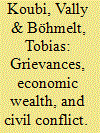

|
|
|
|
|
| Publication |
2014.
|
| Summary/Abstract |
One of the most robust findings in the literature on civil conflicts is that high income levels are associated with a lower risk of conflict onset. This article addresses the wealth-conflict link and discusses it in relation to the dominating `greed vs. grievance' dichotomy. It is further argued that the effect on conflict of grievances, in the form of horizontal inequalities, is conditioned on national wealth. More specifically, there may be a higher risk of civil war in those countries that have much wealth, but where a large share of the population is potentially excluded from accessing it. The empirical analyses testing this argument employ time-series cross-section data for 1951-2004 and find support for the theory. The authors also show that taking this conditional relationship into account improves our ability to predict the onset of civil conflict.
|
|
|
|
|
|
|
|
|
|
|
|
|
|
|
|
| 4 |
ID:
146122
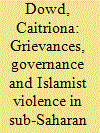

|
|
|
|
|
| Summary/Abstract |
What explains the emergence of Islamist violence as a substantial security threat in such diverse contexts as Kenya, Mali and Nigeria? This article addresses this question through an exploration of the strategies of governance employed by states, and how these shape the emergence and mode of collective violence. Conflict research often emphasises the specificity of Islamist violence; but these conflicts can be understood as a form of political exclusion and grievance-based violence, comparable to other forms of political violence. Further, violent Islamist groups emerge from local conditions: the areas in which groups are established share similar local experiences of governance and political marginalisation; a history of violent conflict on which Islamist militants capitalise; and key triggering events expanding or reinforcing state exclusion. These findings challenge a narrative emphasising the global, interconnected nature of Islamist violence. This article pairs data from the Armed Conflict Location & Event Dataset (ACLED) with Afrobarometer survey data and case study evidence to identify drivers of Islamist violence across three African countries.
|
|
|
|
|
|
|
|
|
|
|
|
|
|
|
|
| 5 |
ID:
156765
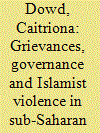

|
|
|
|
|
| Summary/Abstract |
What explains the emergence of Islamist violence as a substantial security threat in such diverse contexts as Kenya, Mali and Nigeria? This article addresses this question through an exploration of the strategies of governance employed by states, and how these shape the emergence and mode of collective violence. Conflict research often emphasises the specificity of Islamist violence; but these conflicts can be understood as a form of political exclusion and grievance-based violence, comparable to other forms of political violence. Further, violent Islamist groups emerge from local conditions: the areas in which groups are established share similar local experiences of governance and political marginalisation; a history of violent conflict on which Islamist militants capitalise; and key triggering events expanding or reinforcing state exclusion. These findings challenge a narrative emphasising the global, interconnected nature of Islamist violence. This article pairs data from the Armed Conflict Location & Event Dataset (ACLED) with Afrobarometer survey data and case study evidence to identify drivers of Islamist violence across three African countries.
|
|
|
|
|
|
|
|
|
|
|
|
|
|
|
|
| 6 |
ID:
140734
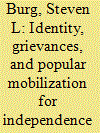

|
|
|
|
|
| Summary/Abstract |
Ted Robert Gurr explains group mobilization in terms of the joint effects of shared identity, economic and status grievances, and the actions of political entrepreneurs. This article examines the relative effects of identity, material grievances, and estimates of the consequences of independence on two key indicators of support for independence in Catalonia: declared preferences for independence and intentions to vote for independence in a future referendum. We examine the impact of political entrepreneurs by analyzing the vote for independence-oriented parties in the 2012 Catalan election. Our findings suggest mobilization is more a product of strong Catalan identity than of grievance, and that mitigation of Catalan demands will therefore require increasing the recognition and status of Catalonia in the Spanish state.
|
|
|
|
|
|
|
|
|
|
|
|
|
|
|
|
| 7 |
ID:
182542
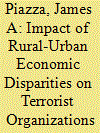

|
|
|
|
|
| Summary/Abstract |
This study investigates the influence of rural-urban economic disparities on the survival and tactical choices of resident terrorist groups. These disparities inflame social and ethnic group grievances and erode the state’s capacity to police its rural hinterlands, thereby motivating support for terrorists and providing resident terrorist groups with the ability to attack with impunity. Based on the Extended Data on Terrorist Groups (EDTG), survival analysis shows that rural-urban disparities foster terrorist group survival. Other empirical methods – negative binomial regressions and competing risk analysis – indicate how rural-urban disparities and other controls affect resident terrorist groups’ campaigns and prospects. With mediation tests, rural-urban inequalities are shown to benefit terrorist groups by increasing social group grievances and by limiting host state’s control over territory.
|
|
|
|
|
|
|
|
|
|
|
|
|
|
|
|
| 8 |
ID:
184195
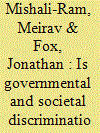

|
|
|
|
|
| Summary/Abstract |
This study asks whether governmental and societal discrimination against Muslim minorities explains the outflow of foreign fighters from non-Muslim-majority countries to Syria and Iraq. We use data from the ICSR, Soufan Group, Pokalova (2018), and RASM datasets to examine the connection between discrimination directed at Muslim minorities and the number of foreign fighters originating in a country. We apply grievance-based theory to examine whether minority-specific objective discrimination is behind the phenomenon. We find little evidence that discrimination increases the outflow of foreign fighters, but this outflow is higher from wealthier countries. The findings indicate that if grievances are a motivation for individuals to become foreign fighters, they are not connected to objective discrimination. This implies that at least some of the grievances relate to personal circumstances or that immigrant minorities are more likely to perceive inequality in wealthier countries.
|
|
|
|
|
|
|
|
|
|
|
|
|
|
|
|
| 9 |
ID:
124501
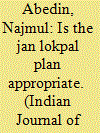

|
|
|
|
|
| Publication |
2012.
|
| Summary/Abstract |
when ombudsman institution was first created in Scandinavia more than 200 years ago its main responsibilities were to redress general or ordinary grievances and complains of citizens against public bureaucracies / administration (not against public representatives) and to protect their rights and liberties against bureaucratic encroachment or maladministration. It was not intended to fight or investigate corruption or to look into the malpractices of the political authorities.
|
|
|
|
|
|
|
|
|
|
|
|
|
|
|
|
| 10 |
ID:
141230
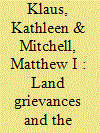

|
|
|
|
|
| Summary/Abstract |
Recent studies have asked why elites resort to violence, yet many overlook the process and dynamics of mobilizing violence. How do politicians convince their supporters to fight? This article argues that in multi-ethnic and democratizing societies where land and property rights are weak and politicized, land grievances can provide leaders with a powerful tool to organize electoral violence. We develop a theory to show how land grievances can give rise to violent mobilization when leaders frame elections as a threat to the land security of supporters or an opportunity to reclaim land or strengthen land rights. Conversely, land grievances are ineffective when citizens do not believe that elections signal a credible threat to their land security or an opportunity to strengthen land rights. We further specify how the type of land grievance shapes the logic and form of violent action. Grievances based on land insecurity shape a pre-emptive logic of violence, while grievances based on competing land claims often shape an opportunistic logic of electoral violence. The article examines the validity of our theory using a comparative case study between zones of escalation and non-escalation of violence during post-electoral crises in Kenya (2007–08) and Côte d’Ivoire (2010–11). By observing the variation between positive and negative cases, the article identifies factors that foment and constrain the mobilization of election violence.
|
|
|
|
|
|
|
|
|
|
|
|
|
|
|
|
| 11 |
ID:
188952


|
|
|
|
|
| Summary/Abstract |
In recent decades, Hong Kong witnessed a number of protest movements that drew high levels of participation, most of which revolved around political issues. Why did ordinary citizens protest? What were the underlying factors that motivated Hongkongers to protest? We argue that post-materialism and grievances toward the government increase the selective expressive benefits for individuals to participate in protests. We illustrate that the two factors contribute to the protest movements in Hong Kong in general. Using the World Values Survey data, we found that post-materialism interacted with grievances toward the political system to increase Hongkongers’ propensity to protest. Our findings have important implications for the 2019 Anti-Extradition Law Movement in Hong Kong.
|
|
|
|
|
|
|
|
|
|
|
|
|
|
|
|
| 12 |
ID:
190880


|
|
|
|
|
| Summary/Abstract |
Extant research highlights low or unequal access of ethnic groups to socio-economic resources as a driver of communal violence. However, less is known about how institutional factors, such as control over ethnofederal units, influence the distribution of these resources in the first place. Conversely, the literature on ethnofederalism has focused on conflicts that involve the central government, while neglecting its unintended consequences at the subnational level. Building on both literatures, we argue that ethnofederalism increases the risk of communal violence between locally dominant and non-dominant groups through two mechanisms. First, it increases grievances among locally non-dominant groups. Second, it increases the utility of coercive strategies for locally dominant groups. Through both processes, ethnofederalism creates incentives for group elites to use communal violence in order to attain or maintain control over local government office. We test our argument in a subnational analysis of Ethiopia’s ethnofederal system, combining new spatial data on local demographics, government control, and horizontal inequalities. We further substantiate our analysis with quantitative tests of the mechanisms’ intermediate implications and with original interview data gathered during fieldwork. Our results highlight the importance of accounting for institutional factors in the comparative study of communal violence.
|
|
|
|
|
|
|
|
|
|
|
|
|
|
|
|
| 13 |
ID:
142644
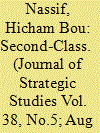

|
|
|
|
|
| Summary/Abstract |
The defection of a significant number of Sunni officers amidst the ongoing turmoil in Syria created a unique opportunity to get access to original data on the Syrian armed forces. This study draws on extensive fieldwork to probe the sectarian question in the Syrian officer corps. On the basis of a series of interviews conducted throughout the summer of 2014, I investigate the politics and consequences of sectarian stacking in the Syrian military as well as the root causes of Sunni officers’ grievances and alienation. My conclusions draw on an original database that compiles the sectarian affiliations of 81 prominent officers who occupied the most senior military positions under Bashar al-Asad.
|
|
|
|
|
|
|
|
|
|
|
|
|
|
|
|
| 14 |
ID:
163432
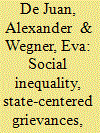

|
|
|
|
|
| Summary/Abstract |
What role does horizontal social inequality play for political protest in middle-income countries? We argue that public social service provision is an important driver of state perceptions. When a state fails to deliver services in an equitable manner, trust in institutions erodes and protest becomes more likely. We use a mixed methods design to investigate this argument in South Africa. First, we combine police event records with census data to estimate correlations between service inequality and protests. Second, we draw on an opinion survey with 27,000 respondents to investigate the suggested mechanism linking social inequality to protest through political attitudes. Third, we focus on qualitative protest accounts in two areas identified by a matching approach to assess the plausibility of our quantitative findings. Throughout these analyses, we document a robust association between horizontal social inequality and protest.
|
|
|
|
|
|
|
|
|
|
|
|
|
|
|
|
| 15 |
ID:
133656
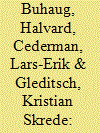

|
|
|
|
|
| Publication |
2014.
|
| Summary/Abstract |
Much of the recent research on civil war treats explanations rooted in political and economic grievances with considerable suspicion and claims that there is little empirical evidence of any relationship between ethnicity or inequality and political violence. We argue that common indicators used in previous research, such as the ethno-linguistic fractionalization (ELF) and the Gini coefficient for income dispersion, fail to capture fundamental aspects of political exclusion and economic inequality that can motivate conflict. Drawing on insights from group-level research, we develop new country-level indices that directly reflect inequalities among ethnic groups, including political discrimination and wealth differentials along ethnic lines. Our analysis reveals that these theoretically informed country profiles are much better predictors of civil war onset than conventional inequality indicators, even when we control for a number of alternative factors potentially related to grievances or opportunities for conflict.
|
|
|
|
|
|
|
|
|
|
|
|
|
|
|
|
|
|
|
|
|